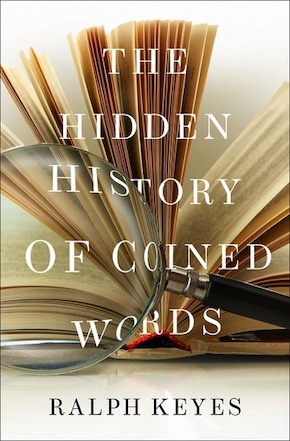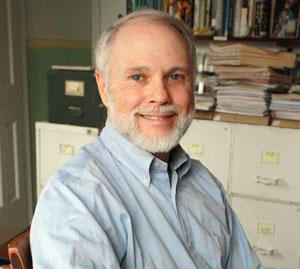Literary lingo
by Ralph Keyes While serving in World War II, Joseph Heller concluded that war was a farce in which only those crazy enough to fight were considered sane enough to do so. That became the theme of a novel he wrote several years later. Heller titled his novel Catch-18. Just as this book was about to be published in 1961 its editor discovered that an upcoming novel by Leon Uris was called Mila-18. “He had stolen our number,” the editor, Robert Gottlieb, later recalled. So Gottlieb and Heller began to kick around alternative figures. Eleven was out, due to the recent movie Ocean’s 11. Fourteen wasn’t funny. Twenty-six lacked a certain je ne sais quoi. The challenge of finding a new number began to disturb Gottlieb’s sleep. One night it came to him: 22. In the morning he called Heller and said “I’ve got it. It’s Catch-22. It’s funnier than 18.” Heller agreed. What made 22 funnier than 18? “Who knows,” Gottlieb told TV host Charles Osgood. “It just sounds funnier.”
While serving in World War II, Joseph Heller concluded that war was a farce in which only those crazy enough to fight were considered sane enough to do so. That became the theme of a novel he wrote several years later. Heller titled his novel Catch-18. Just as this book was about to be published in 1961 its editor discovered that an upcoming novel by Leon Uris was called Mila-18. “He had stolen our number,” the editor, Robert Gottlieb, later recalled. So Gottlieb and Heller began to kick around alternative figures. Eleven was out, due to the recent movie Ocean’s 11. Fourteen wasn’t funny. Twenty-six lacked a certain je ne sais quoi. The challenge of finding a new number began to disturb Gottlieb’s sleep. One night it came to him: 22. In the morning he called Heller and said “I’ve got it. It’s Catch-22. It’s funnier than 18.” Heller agreed. What made 22 funnier than 18? “Who knows,” Gottlieb told TV host Charles Osgood. “It just sounds funnier.”
Would the title of Heller’s novel have become so iconic had it been called Catch-18? Or Catch-14? Or Catch-26? Certainly those versions sound discordant to ears accustomed to Catch-22. Although there are other ways to describe paradoxical experiences – a no-win situation, a double bind, damned if you do, damned if you don’t – ‘Catch-22’ is the idiom we use most often. Whom should we credit with coining that concept? Heller? Gottlieb? Both? Call it a co-coinage.
Some of our most useful terms have emerged from the pens and keyboards of authors such as Joseph Heller. Heller’s fellow World War II veteran Norman Mailer is another one. Like Heller, Mailer based a first novel on his combat experience: The Naked and the Dead (1948). Anticipating censorship, Mailer used the word fug in lieu of ‘fuck’ several hundred times in his manuscript. This coinage attracted lots of attention, due partly to a popular anecdote in which the actress Tallulah Bankhead said when meeting Mailer, “So you’re the author who doesn’t know how to spell ‘fuck’.” (Bankhead’s biographer and Mailer himself denied that this ever happened. Mailer – who insisted that what Bankhead actually said when greeting him was “Hello” – thought the racier version, that appeared in an April 1950 column called ‘Edith Gwynn’s Hollywood’, originated with her press agent.) For some time after The Naked and the Dead’s publication, fug was our preferred euphemism for fuck, before giving way to ‘frig’, ‘frick’ and ‘freak’ (friggin’, frickin’, freakin’). During the Aquarian Age a rock group called themselves The Fugs.
Writers who can’t come up with the right word to describe something feel no compunction about simply making one up.”
Factoid was Norman Mailer’s other contribution to the postwar lexicon. This coinage first appeared in his 1973 biography of Marilyn Monroe, where Mailer defined it as “facts which have no existence before appearing in a magazine or newspaper.” Although factoid proved to be an unusually successful neologism, along the way it took on a meaning quite different than the one its coiner had intended. Rather than the subtle, supple notion Mailer had in mind, one that anticipated the era of ‘alternative facts’, over time factoid came to refer simply to trivial pieces of information.
The fact that authors like Norman Mailer have contributed more than their share of neologisms to the world’s lexicons is due not only to a hunger for recognition that typifies those who write but to the very nature of authorship. As creative users of language, how could they not have a yen to create new words? Writers who can’t come up with the right word to describe something feel no compunction about simply making one up.
John Milton certainly didn’t. After diligent scouring of the OED, Milton scholar Gavin Alexander of Cambridge University has concluded that the 17th-century poet added some 630 words to the English language. Alexander’s list includes advantage, complacency, damp, dismissive, fragrance, jubilant, obtrusive, padlock, and terrific. He is just one of many scholars who admire this poet’s verbal virtuosity. Creating playlists of Miltonisms seems to be an integral part of assessing his work. A book about Milton by Logan Pearsall Smith featured the author’s own favourites: bannered, liturgical, echoing, and Satanic. In The Miracle of Language, Richard Lederer includes on his list infinitude, all-conquering, smooth shaven, and light fantastic. Authorisms author Paul Dickson, who considers John Milton his favourite author-neologiser, told an interviewer that he particularly admires such Miltonisms as impassive, earth-shaking, sectarian, and dimensionless, along with phrases such as all hell broke loose and by hook or by crook.
Milton lived in a time when the English language was mushrooming, along with scientific and other discoveries. This invited writers to fill gaps in the lexicon with words of their own creation. They did so in diverse ways.
When composing his poetry, writes Logan Pearsall Smith, Milton tapped multiple sources “from old archaic words to the new words he created for himself out of the rags and fragments found in their recesses.” Gavin Alexander believes that the freedom Milton felt to tinker with language lay in his advocacy of political, religious and personal liberty. One might also speculate that the poet’s blindness (Milton couldn’t see for the last two decades of his life, including the period when he dictated the ten volumes of Paradise Lost to his daughters and various secretaries) may have had something to do with his verbal prowess. Perhaps the imagination called for by a writer who can’t easily look up existing words encouraged him to create new ones.
Because the puritanical poet couldn’t find a word he considered strong enough to condemn those who engaged in degenerate behaviour, Milton invented two of his own: debauchery and depravity. In need of a term for what’s perceived through the senses without bringing sex to mind, Milton coined sensuous (only to have that word take on erotic overtones anyway). Love-lorn – Milton’s word for being forsaken by a lover – has also developed a different meaning. So has terrific, which Milton used in Paradise Lost to mean ‘terrifying’, and unoriginal which he created for that epic poem, to refer to being of unknown origin.
According to Gavin Alexander, Milton used several strategies when coining words such as these. One consisted of reformulating existing words (stunning, space). Another involved making one word out of two (self-delusion, arch-fiend). And – in a strategy Milton relied on for more than a hundred of his neologisms – converting neutral old words into negative new ones by the addition of a prefix: unprincipled, unaccountable, unintended and irresponsible. In one case, adding a prefix to a word of his own invention allowed Milton to score a neological two-fer: first coining obtrusive, then doubling up with unobtrusive.
Although many of Milton’s neologisms were created by tinkering with existing terms, his most notable contribution to the lexicon was original, if inadvertent. In Paradise Lost Milton called Satan’s headquarters Pandemonium. This term combined the Greek pan, or ‘all’, with the Latin daemonium, which referred to demonic spirits. With its first letter lower-cased, Milton’s name for the devil’s chaotic lair left its name behind to refer to a state of chaos in general.
Excerpted from The Hidden History of Coined Words (OUP, £21.99)
 Ralph Keyes is the author of several books, including The Post-Truth Era, cited by Oxford Dictionaries as a primary source for their 2016 Word of the Year, and Euphemania: Our Love Affair with Euphemisms (2010), which was published in the UK as Unmentionables. He has appeared widely on US TV and radio, and has written for Esquire, GQ, Good Housekeeping, Glamour, Newsweek, Parade, Sports Illustrated, Harper’s and The American Scholar, where he also wrote a column on language. He lives in Portland, Oregon. The Hidden History of Coined Words is published by OUP in hardback and eBook.
Ralph Keyes is the author of several books, including The Post-Truth Era, cited by Oxford Dictionaries as a primary source for their 2016 Word of the Year, and Euphemania: Our Love Affair with Euphemisms (2010), which was published in the UK as Unmentionables. He has appeared widely on US TV and radio, and has written for Esquire, GQ, Good Housekeeping, Glamour, Newsweek, Parade, Sports Illustrated, Harper’s and The American Scholar, where he also wrote a column on language. He lives in Portland, Oregon. The Hidden History of Coined Words is published by OUP in hardback and eBook.
Read more
ralphkeyes.com
@OxUniPress

